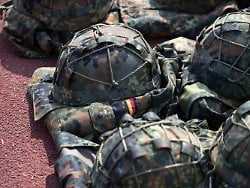“A very clear signal”
Germany delivers 5,000 military helmets to Kiev
01/26/2022, 2:49 p.m
Germany wants to supply Ukraine with military equipment. This is announced by Defense Minister Lambrecht. However, it is questionable whether the promised delivery will help Kiev much, given that there are more than 100,000 Russian soldiers at the border.
Defense Minister Christine Lambrecht has announced that Germany will supply Ukraine with 5,000 military protective helmets. This is a “very clear signal: we stand by your side,” said the SPD politician after a meeting of the Defense Committee in Berlin.
She welcomed the fact that talks on the Ukraine conflict are getting back on track. “We are working to resolve this conflict peacefully in the middle of Europe,” she said. At the same time, Lambrecht emphasized that there were red lines in these talks that could not be negotiated. “Compliance with international law cannot be negotiated. The integrity of states and alliance sovereignty cannot be discussed,” she said.
Lambrecht also pointed to Germany’s extensive commitment to Ukraine. Aid amounting to 1.8 billion euros would be provided in development cooperation alone.
Berlin does not want to deliver weapons
Fearing a Russian attack, Ukraine had repeatedly demanded that Germany also supply weapons. However, she was met with overwhelming rejection in the traffic light coalition. Chancellor Olaf Scholz reiterated on Monday evening: “We do not supply lethal weapons.”
The situation is obviously different with a planned delivery of howitzers from Estonia to Ukraine. The weapons come from GDR stocks and were given by Germany first to Finland and then on to Estonia. The federal government must agree to a resale. Scholz said the process is still being examined.
On January 19, Ukraine wrote to the Ministry of Defense asking for equipment assistance, citing helmets and body armor as needed. According to the ministry, no specific quantities were requested.
Sharp criticism of the federal government
Because of its hesitant attitude in the Ukraine crisis, the federal government had to take a lot of criticism internationally. “The current German policy towards Russia in no way meets the requirements of NATO, the EU and the German partners,” said Latvian Defense Minister Artis Pabriks of the “Bild” newspaper. He criticized Germany for not supplying arms to Ukraine and also forbidding the export of German arms to Ukraine via Estonia. This was “felt as a shameful position in all three Baltic states and also in all northern European states”. He emphasized: “If you forbid someone to obtain defense funds, you are not supporting peace. On the contrary.”
The Ambassador of Ukraine in Berlin, Andriy Melnyk, renewed his appeal to deliver defensive weapons to his country. He called on the federal government on ZDF to “act much more actively, we urgently need defensive weapons”. Ukraine cannot hope for NATO assistance. “We are alone.” He hopes that “the Germans will be shaken up and realize that we are facing the greatest danger since the Second World War”.
Russia checks combat readiness
According to an agency report, Russia has begun inspections of its troops’ combat readiness on the border with Ukraine. More than 6,000 soldiers were involved in the measures in Russia’s southern military district, the RIA news agency reported, citing the Russian military.
Russia has massed around 100,000 soldiers on the border with Ukraine. The government in Moscow rejects the accusation of preparing an invasion. But she is demanding security guarantees from NATO, such as a refusal to admit Ukraine. The alliance rejects this with reference to the right of states to self-determination, but has so far given Ukraine no concrete prospect of accession.
On Monday, NATO announced that it would strengthen its combat troops in Eastern Europe. The US government said it would put 8,500 soldiers on readiness for transport. The Presidential Office in Moscow said on Tuesday that the behavior of the Washington government was increasing tensions. Russia is watching the developments with great concern.
Despite the increasing tensions, the so-called Normandy format of Germany, France, Russia and Ukraine wants to meet again this Wednesday in Paris for the first time in more than two years – at the level of political directors. Mediated by Germany and France, Russia and Ukraine signed the Minsk Agreement in 2015 to pacify eastern Ukraine.
